英语教师辅导讲义
英语家教讲义1405

英语教教备课1.试讲内容(虚拟语气)。
2.做测试题。
摸底。
()3.点拨知识。
虚拟语气.又称假设语气,是谓语动词的一种形式,表示说话人叙述的内容与事实相反,在现实中并不存在,或实现的可能性很小。
即当一个人说话时欲强调其所说的话是基于自己的主观想法,愿望,假想,猜测,怀疑或建议,而不是根据客观实际,就用虚拟语气。
虚拟语气(the subjunctive mood),又称假设语气,是谓语动词的一种形式,表示说话人叙述的内容与事实相反,在现实中并不存在,或实现的可能性很小。
一、动词的语气语气用来区别讲话人对某一行为或事情的看法和态度。
英语中的语气(mood)有三种,分别是陈述语气、祈使语气和虚拟语气。
1.陈述语气2.祈使语气祈使语气表示说话人向对方提出请求或下达命令。
Come this way, please! 请这边走。
3.虚拟语气虚拟语气表示动作或状态不是客观存在的事实,而是说话人的主观愿望、假设或推测等。
If I were a bird, I could fly in the air. 如果我是一只小鸟,我就能在空中飞行。
二、条件句中的虚拟语气英语中条件从句有两类,一类是真实条件句,另一类是非真实条件句。
如果假设的情况可能发生,是真实条件句;如果假设的情况是不存在的或不大可能发生的,则是虚拟条件句。
A.真实条件句真实条件句表示的假设是可能发生或实现的,主句和从句的谓语动词都要用陈述语气。
If he doesn't come at 8, we won't wait for him. 如果他八点不来,我们就不等他了。
If a flood happened in the past, there was usually a great loss of life and property. 过去发生洪水的话,常有很大的生命和财产损失。
B.非真实条件句在含有非真实条件句的复合句中,主句和从句的谓语动词都要用虚拟语气,其构成有三种形式:a 与现在事实相反if条件句的谓语:were did主句的谓:would (couldshouldmight) + do条件从句用动词的过去式(be动词用were),主句用should(第一人称)或would (全部人称)+动词原形。
四年级英语学科教师辅导讲义

四年级英语学科教师辅导讲义年级:四年级辅导科目:英语课时数:3 学生:***** 辅导老师:*****课题Lesson 1 —Lesson 2教学目的1.熟读并记忆Lesson 1 —Lesson 2 的单词2.认识be动词,冠词,介词,名词和代词3,掌握be动词,冠词,介词,名词和代词的用法4,学习两个音标5,做相关习题并熟读unit1.2单元课文教学内容Step 1: New words and expressionsWindow 窗户board 写字板light 灯picture 图画Door 门floor 地板classroom 教师computer 计算机Wall 墙fan 电风扇Chinese book 语文书storybook故事书Notebook 笔记本thirty 三十fifty 五十heavy 沉重的Step 2:认识be动词,冠词,介词,名词和代词A:be 动词_____________________________________________________________B: 介词C: 冠词D: 名词E:代词____________________________________________________________Step 2: Lead-inStep 3.Teaching key pointsA..Lesson 2 the dream看课文图片按自己的理解用简单的英语讲故事B.读课文,理解课文内容及情景C.熟读课文并掌握故事及人物情景D. New words.about 关于dolphin 青蛙dragon 龙dream梦fight打斗had to 不得不her 她的nasty凶狠的story故事told讲了★给下面故事排列正确的顺序( ) Dad told her a story ._____________________________________________()It was a nasty story ._________________________________________________ ( ) Biff could not sleep._____________________________________________ ( ) Biff dreamed about dragon._________________________________________________ ( ) The story was about a dragon ._________________________________________________ ( ) Biff went downstairs._________________________________________________ ( ) Mum told her a story .. _________________________________________________ ( ) The story was about a dolphin ._________________________________________________ ( ) It was a very nasty dragon._________________________________________________ ( ) Biff had to fight it ._________________________________________________ ( ) Biff dreamed about a dolphin.Step 4 Exercise practiceA用forgot写日记B translation1,我喜欢花。
黑龙江省哈尔滨市人教版七年级上册英语-教师辅导讲义教学【一般现在时】

三、一般现在时构成
基本结构:①be 动词;②行为动词 ③情态动词
⑴ be 动词:主语 + be + 其他 she is a girl.
be 包 括 哪 些 ?is
am
are
3、 什么时候用 is? 什么时候用 am? 什么时候用 are?
取决于主语是单数还是复数
主语为单数时――→is 主语为复数时――→are 主语为“I”时 ――→am
注意:当主语为第三人称单数时,行为动词要加 s 或者 es
规则
动词原形
第三人称单数形式
一般在词尾加-s,(清辅音后读∕s∕, play
在浊辅音后读∕z∕;在 t 后读∕ts∕,在 d leave
后读∕dz∕。)
swim
以 字 母 s,x,ch,sh,o 结尾的 词 加 pass
-es,读∕iz∕,如果动词原形词尾已有 fix
当主语为复数时,用助动词 do 构成否定 当主语为单数时,用助动词 does 构成否定 注意:don’t 和 doesn’t 之后动词一定要用原形
⑶主语 + 情态动词 + 动词原形+其他
She can speak English 注意:情态动词后的动词一定要用原形
否定句的构成
主语 + 情态动词 + not + 动词原形 + 其他
am not = ‘m not are not = aren’t
1、Kitty
(not) an English girl.
tall.5、
2 / 12
黑龙江省哈尔滨市人教版七年级上册英语-教师辅导讲义教学【一般现在时】
2、We
(not) students.3、I
八年级英语一对一学科教师辅导讲义

重点、难点:
动词不定式to do的用法
【课前过关】:U5单词听写
【入门测】:汉译英。
1.我很抱歉听到这个(表示对发生的不好的事感到同情或惋惜)
_____________________________________________.
2.有什么问题吗?
_____________________________________________.
注意区分复合形容词three-day与名词短语three days.复合形容词three-day, two-month, four-year-old等只能作定语修饰名词。
练习:He is only___________________________(一个三岁的男孩).
2.It will take us a few days to get there by bike.译:____________________________________
They invite me to go to Paris with them._______________________________________
You can ask them to wear short coats and slim pants._______________________________________
I think the most exciting way isto sell flowers in the evening.
Your group’s task is to find out the cost to go by train.
(4)做定语:可以用来修饰人和物,放在被修饰词后面。
二年级英语学科教师辅导讲义

_______________________________________________
9,大家都去了公园
_______________________________________________
Yellow黄色red红色blue蓝色green绿色have有
C:数词(根据人物数量学习数词)
_______________________________________________________________
3)翻译句子
1.我的妈妈喜欢玩电脑游泳。
_______________________________________________________________
2.我爸爸不喜欢唱歌。
7.他喜欢什么?
_______________________________________________________________
8.她不喜欢什么?
_______________________________________________________________
3.我不喜欢科学。
_________________________________________________
4.我姐姐不喜欢跳舞。
_________________________________________________
5.我弟弟喜欢画画。
_________________________________________________
_____________________________________________________________
翻译单词:
一心教育英语学科教师辅导讲义
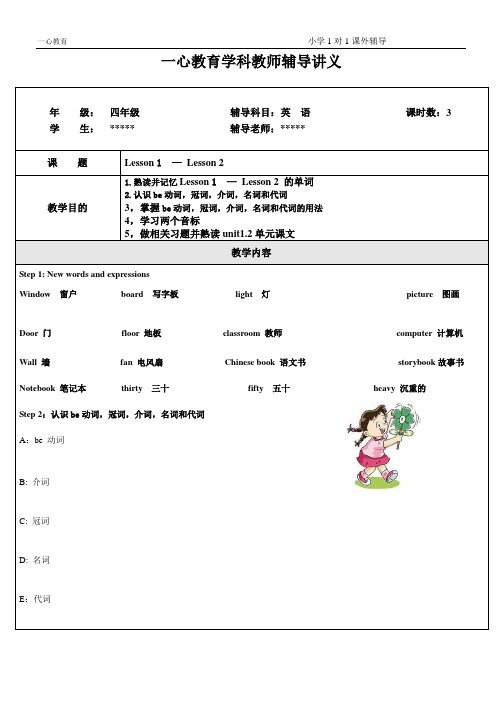
_______________________________________________
4,我有一条黄色的裙子_
4,Dad got a blue fish .
_______________________________________________
5,It was a sunny day.
_______________________________________________
6,妈妈和爸爸生气了。
_______________________________________________
Step 2:认识be动词,冠词,介词,名词和代词
A:be动词
_____________________________________________________________
B:介词
C:冠词
D:名词
E:代词
____________________________________________________________
_________________________________________________
( ) Biff went downstairs.
_________________________________________________
( ) Mum told her a story .
. _________________________________________________
( ) The story was about a dolphin .
_________________________________________________
九年级英语教师辅导讲义Unit13We’retryingtosavetheearth现在完成时(新版)人教新目标版

第(1)课时课题:书法---写字基本知识课型:新授课教学目标:1、初步掌握书写的姿势,了解钢笔书写的特点。
2、了解我国书法发展的历史。
3、掌握基本笔画的书写特点。
重点:基本笔画的书写。
难点:运笔的技法。
教学过程:一、了解书法的发展史及字体的分类:1、介绍我国书法的发展的历史。
2、介绍基本书体:颜、柳、赵、欧体,分类出示范本,边欣赏边讲解。
二、讲解书写的基本知识和要求:1、书写姿势:做到“三个一”:一拳、一尺、一寸(师及时指正)2、了解钢笔的性能:笔头富有弹性;选择出水顺畅的钢笔;及时地清洗钢笔;选择易溶解的钢笔墨水,一般要固定使用,不能参合使用。
换用墨水时,要清洗干净;不能将钢笔摔到地上,以免笔头折断。
三、基本笔画书写1、基本笔画包括:横、撇、竖、捺、点等。
2、教师边书写边讲解。
3、学生练习,教师指导。
(姿势正确)4、运笔的技法:起笔按,后稍提笔,在运笔的过程中要求做到平稳、流畅,末尾处回锋收笔或轻轻提笔,一个笔画的书写要求一气呵成。
在运笔中靠指力的轻重达到笔画粗细变化的效果,以求字的美观、大气。
5、学生练习,教师指导。
(发现问题及时指正)四、作业:完成一张基本笔画的练习。
板书设计:写字基本知识、一拳、一尺、一寸我的思考:通过导入让学生了解我国悠久的历史文化,激发学生学习兴趣。
这是书写的起步,让学生了解书写工具及保养的基本常识。
基本笔画书写是整个字书写的基础,必须认真书写。
课后反思:学生书写的姿势还有待进一步提高,要加强训练,基本笔画也要加强训练。
总第(2)课时课题:书写练习1课型:新授课教学目标:1、教会学生正确书写“杏花春雨江南”6个字。
2、使学生理解“杏花春雨江南”的意思,并用钢笔写出符合要求的的字。
重点:正确书写6个字。
难点:注意字的结构和笔画的书写。
教学过程:一、小结课堂内容,评价上次作业。
二、讲解新课:1、检查学生书写姿势和执笔动作(要求做到“三个一”)。
2、书写方法是:写一个字看一眼黑板。
最新新高一英语教师辅导讲义
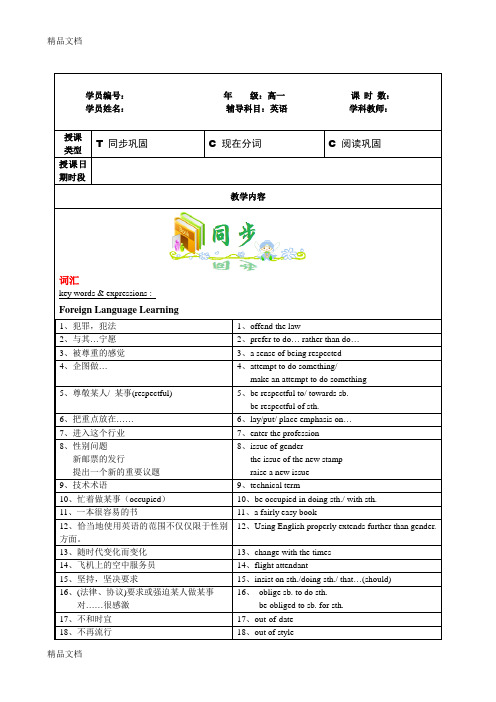
学员编号:年级:高一课时数:学员姓名:辅导科目:英语学科教师:授课类型T同步巩固 C 现在分词 C 阅读巩固授课日期时段教学内容词汇key words & expressions :Foreign Language Learning1、犯罪,犯法1、offend the law2、与其…宁愿2、prefer to do… rather than do…3、被尊重的感觉3、a sense of being respected4、企图做…4、attempt to do something/make an attempt to do something5、尊敬某人/ 某事(respectful) 5、be respectful to/ towards sb.be respectful of sth.6、把重点放在……6、lay/put/ place emphasis on…7、进入这个行业7、enter the profession8、性别问题新邮票的发行提出一个新的重要议题8、issue of genderthe issue of the new stampraise a new issue9、技术术语9、technical term10、忙着做某事(occupied)10、be occupied in doing sth./ with sth.11、一本很容易的书11、a fairly easy book12、恰当地使用英语的范围不仅仅限于性别方面。
12、Using English properly extends further than gender.13、随时代变化而变化13、change with the times14、飞机上的空中服务员14、flight attendant15、坚持,坚决要求15、insist on sth./doing sth./ that…(should)16、(法律、协议)要求或强迫某人做某事对……很感激16、oblige sb. to do sth.be obliged to sb. for sth.17、不和时宜17、out-of-date18、不再流行18、out of style现在分词学习非谓语动词包括动词不定式、动名词、动词现在分词和过去分词四种。
浙江省湖州市七年级英语上册 教师辅导讲义 Unit 3 Is this your pencil教材梳

wordUnit 3 Is this your pencil 单词pencil /'pensl/ n. 铅笔book /buk/ n. 书eraser /i'reizə/ n. 橡皮box /bɒks/ n. 箱;盒pencil box 铅笔盒;文具盒schoolbag /'sku:lbæg/ n. 书包dictionary /'dikʃənəri/ n. 词典;字典his /hiz/ pron. 他的mine /main/ pron. 我的hers /hə:z/ pron. 她的excuse /ik'skju:z/ v. 原谅;宽恕me /mi:/ pron. (I的宾格)我excuse me 劳驾;请原谅thank /θæŋk/ v. 感谢;谢谢teacher /'ti:tʃə/ n. 老师;教师about //ə'baut/ prep. 关于What about...?(询问消息或提出建议..怎么样?yours /jɔ:z/ pron. 你的;你们的for /fɔ:/ prep. 为了;给;对thank you for... 为......而感谢help /help/ v.&n. 帮助;援助wele /'welkəm/ adj. 受欢迎的You're wele. 别客气。
baseball /'beisbɔ:l/ n. 棒球watch /wɒtʃ/ n. 表;手表puter /kəm'pju:tə/ n. 计算机;电脑game /geim/ n. 游戏;运动;比赛card /kɑ:d/ n. 卡片ID card 学生卡;某某notebook /'nəutbuk/ n. 笔记本ring /riŋ/ n. 戒指bag /bæg/ n. 袋;包in /in/ prep. 在......里library /'laibrəri/ n. 图书馆ask /ɑ:sk/ v. 请求;要求;询问ask... for... 请求;恳求(给予)find /faind/ v. (过去分词 found)找到;发现some /sʌm/ adj. 一些;某些classroom /'klɑ:sru:m/ n. 教室/'emeil/ n. (=email)电子at /æt/ prep. 按照;根据;在(某处、某时间时刻)call /kɔ:l/ v. (给......)打lost /lɒst/ v. (动词lose的过去式)遗失;丢失must /mʌst/ modal v. 必须set /set/ n. 一套;一副;一组a set of 一套;一副;一组短语:pencil box 铅笔盒 excuse me 打扰了 the blue pen 这支蓝色的钢笔Anna’s book 安娜的书 ID card 某某 school ID card 学生证puter game 电子游戏 in the school library 在学校图书馆 ask…for …向…要…知识结构sb 给某人发电子 call sb 给某人打 lose sth 丢失某物find sth 拾到某物 a set of keys 一串钥匙 lost and found 失物招领必背典句1.—Is this your pencil? 这是你的铅笔吗?—Yes, it is. 是的,它是。
七年级英语下册教师辅导讲义therebe,some和any区别牛津版

2*There _______ so _________ for me __________.
3A. are, many our school this evening.
4A.B. be, onC. cooking.
3. We don't you are in trouble?
8. There_______ (be) some milk and some eggs in the kitchen.
9. KFC is a good place_______ (meet) friends, I think.
10._______ (be) there any the shop near our school?
* There be + sth. + to do. 有…(事)要做。
* There ห้องสมุดไป่ตู้e + sb. + doing sth. 有…(人)正做某事
1Eg: 有很多作业要做。 There is a lot of the bottle.
2____________ any fish in the river.
A. isB. areC. I the sky.
1*今天有很多家务活要做吗?
_________ there a lot of _________ _________ _________ today?
2下个月有几场足球赛。
There ______________________________________ next month.
6__________ some writing paper and exercise books on the desk.
江苏省南通市七年级英语下册 教师辅导讲义 Unit 2 牛津版
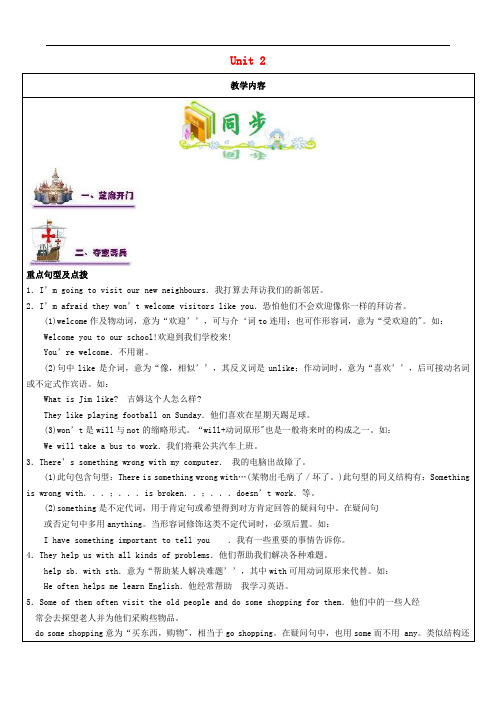
Unit 2教学内容重点句型及点拨1.I’m going to visit our new neighbours.我打算去拜访我们的新邻居。
2.I’m afraid they won’t welcome visitors like you.恐怕他们不会欢迎像你一样的拜访者。
(1)welcome作及物动词,意为“欢迎’’,可与介‘词to连用;也可作形容词,意为“受欢迎的"。
如:Welcome you to our school!欢迎到我们学校来!You’re welcome.不用谢。
(2)句中like是介词,意为“像,相似’’,其反义词是unlike;作动词时,意为“喜欢’’,后可接动名词或不定式作宾语。
如:What is Jim like? 吉姆这个人怎么样?They like playing football on Sunday.他们喜欢在星期天踢足球。
(3)won’t是will与not的缩略形式。
“will+动词原形"也是一般将来时的构成之一。
如:We will take a bus to work.我们将乘公共汽车上班。
3.There’s something wrong with my computer.我的电脑出故障了。
(1)此句包含句型:There is something wrong with…(某物出毛病了/坏了。
)此句型的同义结构有:Something is wrong with...;...is broken..;...doesn’t work.等。
(2)something是不定代词,用于肯定句或希望得到对方肯定回答的疑问句中。
在疑问句或否定句中多用anything。
当形容词修饰这类不定代词时,必须后置。
如:I have something important to tell you .我有一些重要的事情告诉你。
4.They help us with all kinds of problems.他们帮助我们解决各种难题。
七年级英语上册教师辅导讲义Unit8同步讲解牛津版

1房子前面停着一辆警车。
In front of the house _________ ___________ __________ _______.
2铃响了!There goes ________ _________!
3Here _________________.
* on show被展示,上演
1这些天锡惠公园有很多花在展出。
A lot of flowers ___________ ___________ ___________ in Xihui Park these days.
2展出的汽车都很贵。
The cars _________ ___________ ___________ all _____________.
1) be popular with sb.受…喜欢/欢迎
1哪位老师受小学生的欢迎?
_________ teacher ______ __________ _________ ___________?
2足球很受男学生的喜欢。
Football _________ __________ __________ ___________ boy students.
11.看,西蒙来了。Look! Here comes Simon.
12.他穿着一件紫色的衬衫He is wearing a purple shirt
和一条灰色的裤子。and a pair of grey trousers.
13.他灰红相间的领带和他衣服很配。His red and grey tie matches his clothes.
2) among在…中间“三者或三者以上“
英语补习讲义
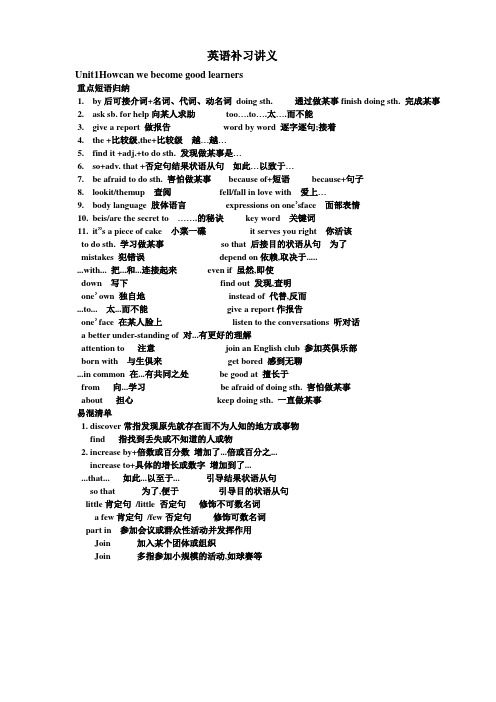
英语补习讲义Unit1Howcan we become good learners重点短语归纳1.by后可接介词+名词、代词、动名词doing sth. 通过做某事finish doing sth. 完成某事2.ask sb. for help向某人求助too….to….太….而不能3.give a report 做报告word by word 逐字逐句;接着4.the +比较级,the+比较级越…越…5.find it +adj.+to do sth. 发现做某事是…6.so+adv. that +否定句结果状语从句如此…以致于…7.be afraid to do sth. 害怕做某事because of+短语because+句子8.lookit/themup 查阅fell/fall in love with 爱上…9.body language 肢体语言expressions on one’sface 面部表情10.beis/are the secret to …….的秘诀key word 关键词11.it”s a piece of cake 小菜一碟it serves you right 你活该to do sth. 学习做某事so that 后接目的状语从句为了mistakes 犯错误depend on依赖,取决于........with... 把...和...连接起来even if 虽然,即使down 写下find out 发现,查明one’ own 独自地instead of 代替,反而...to... 太...而不能give a report作报告one’ face 在某人脸上listen to the conversations 听对话a better under-standing of 对...有更好的理解attention to 注意join an English club 参加英俱乐部born with 与生俱来get bored 感到无聊...in common 在...有共同之处be good at 擅长于from 向...学习be afraid of doing sth. 害怕做某事about 担心keep doing sth. 一直做某事易混清单1. discover常指发现原先就存在而不为人知的地方或事物find 指找到丢失或不知道的人或物2. increase by+倍数或百分数增加了...倍或百分之...increase to+具体的增长或数字增加到了......that... 如此...以至于... 引导结果状语从句so that 为了,便于引导目的状语从句little肯定句/little 否定句修饰不可数名词a few肯定句/few否定句修饰可数名词part in 参加会议或群众性活动并发挥作用Join 加入某个团体或组织Join 多指参加小规模的活动,如球赛等。
英语辅导讲义

英语辅导讲义英语的时态和语态问题这是英语的基本问题。
英语是一门以动词为中心的句子,动词形式的变化是英语用来表示不同意思的主要手段。
英语的每个句子都有时态和语态的问题。
时态和语态都是针对英语的动词来讲的。
这一点一定要明确。
时态实际上就是时间和状态。
时间上我们分为:现在,过去,将来,过去将来。
时间的作用就在于告诉我们谓语动词这个动作发生的时间,即谓语动词是在什么时间发生的。
状态上我们分为:一般进行完成完成进行。
状态的作用就在于告诉我们谓语动词这个动作的状态,是正在进行,还是已经完成等等。
数学:两点确定一条直线。
过两点能确定且只能确定一条直线。
同样在英语里,我们依据时间和状态这两个点也就确定了一个唯一的时态。
Be+ v ing have\has +v pp↓↓↓↓表时间表状态表时间表状态Ving 表主动表进行Vpp 表被动表完成英语时态一般现在时的使用:1.客观真理2.习惯性反复性动作3.持久的状态(或按时刻表或计划等必然发生的事情)4.在时间或条件状语从句中,用一般现在时表将来。
进行时的用法:1.正在做某事2.一段时间内一直在做某事,总是做某事。
3.进行时也可以表示将要发生的事情。
给人一种事情正在一步步的到来的感觉,这些动词一般是一些表示位置移动之类的词,例如,come,go leave , get married 之类的词。
现在完成时的用法:1.从过去某一时间开始,延续到现在对现在造成影响。
和一般过去时的区别在于,是否对现在造成影响。
区分是使用一般过去时还是现在完成时的依据是:是否有表示到目前为止的时间状语或副词等。
一般过去时一般只会给出过去的某一个时间,现在完成时则一般会给出一个与现在有关联的时间状语。
例如:for\since, up to now, so far, in the past ten years, already, yet, over time 见到这些词一般要用现在完成时。
2.过去完成时的使用过去的过去。
初中英语语法辅导讲义稿-(3510)

初中英语语法辅导讲义一、词法(一)名词 (n.)1.判断可数名词与不可数名词可数名词表示的事物有固定的整体,不可再分开。
可数(名词)不可分!不可数名词表示的物质没有固定的外形,可任意分开。
不分不可数(名词)!2.可数名词的用法可数名词又分个体名词和集体名词。
个体名词有单数形式和复数形式。
使用个体名词时,不穿鞋子(-s) 便戴帽 ( 在名词前有冠词a/an) 。
如:I have a book.Books are used for reading.3.不可数名词的用法不可数名词包括物质名词和抽象名词。
使用不可数名词时,前不用 a/an, 后不加-s 。
表达不可数名词的量时,用 a glass/bottle/cup/piece/kilo/bag...of+ 不可数名词。
区分: a pair of shoes (鞋子) /pants (裤子) /glasses (眼镜)。
不可数名词作主语时,谓语动词用第三人称单数形式。
4.名词所有格(名词的名词)1) 's/s' 所有格(用于有生命的事物名词,主要是人名及指人的名词),如:Michael's father;Li Ming's friend;students' book2)of 所有格(用于无生命的事物名词), the + 所有物 + of +所有者。
如: the wall of the classroom; the name of our school3)双重所有格: a friend of my father's4)共有所有格: Lucy and Lily's parents5)并列所有格: Jim's and Kate's rooms are on the second floor.(二)冠词 (art.) -- a/an, the1.a/an的用法:1)表示“一”的概念;2)表示一类人或事物3)用在一些固定词组中: as a result; wait a moment;for a while; in a hurry;have a good time; have a talk/walk/rest/look2.the的用法:1)前面已提到的名词,再次提到时,在前面加the ;2)用在序数词、形容词最高级前和表示方位的名词前;3)用在表示乐器名称的名词前;4)与形容词连用,表示一类人或事物5)用于固定词组中: by the way; at the end; in the sun;in the morning/afternoon/evening; go to the cinema/theater3.不用冠词的情况: 1 )表示泛指的复数名词前;2 )一日三餐名称的名词前;3 )表示球类运动、棋类运动、月份、星期、季节、节日、语言、学科等名词前;4 )有物主代词、指示代词、不定代词修饰的名词前5 )用于固定词组中: by bus/bike/plane/air/sea/ship;at night/noon; at home; after school; in fact; in danger; in time;go to school/work/bed; from morning to night; day andnight (三)代词( pron.)1.人称代词:作主语用主格,作宾语用宾格;2.物主代词:形容词性物主代词 + 名词,后面没有名词时用名词性物主代词;3.返身代词:主语对自己做动作(作宾语)She enjoys herself every day.指主语或宾语本身(作同位语)He can do it by himself.4.指示代词: this ,these ;that ,those ( 近指与远指并有单复数之分 )5.相互代词: each other相“互”代(替主语的个体 )6.不定代词: A. 修饰可数名词的专用语 --many,few,a few;B. 修饰不可数名词的专用语 --much,little,a little;C. 可数名词与不可数名词前的共用语 --a lot of/lots of,some, any, no;(四)数词(num.)1. 基数词“表示数量”,计数词 --hundred, thousand, million, billion;1 )表示年份: in 1975, in 1992, in 1980s, in 1990s2 )表示年龄: He is thirteen years old.He began to learn English in his fifties .(在他五十几岁时)3 )表示时间:分钟数小于或等于30 时,half past two; twenty past nine分钟数大于 30 时, a quarter to ten, five to eleven4)表示顺序:名词+基数词:No.1; Room 918; Class 3, Grade 92.序数词“表示顺序”3.hundreds of(好几百,许许多多), thousands of(成千上万),millions of(数百万);4.分数、百分数、小数的表达法:1)分数:分子用基数词,分母用序数词转化来的名词。
精锐教育英语学科教师辅导讲义
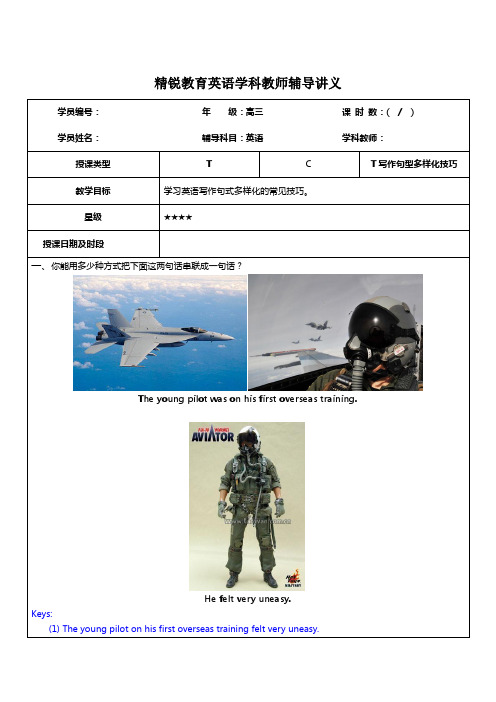
(12) The young pilot was on his first overseas training, which made him feel very uneasy.
竟然至少可以有12种方式!在上述12个句子中,(1)-(7)是简单句;(8)是并列句;(9)-(12)是复杂句。简单句除(2)和(7)之外,其他五样,用的人并不多。合并上述两个句子,人们最喜欢采用复杂句,尤其是(10)和(11)这两句;接着便是并列句(8)。如果大多数人的句子只限于(2),(7), (8), (10)和(11)这五种,而其他的则放弃,不是很可惜吗?
(8) The young pilot was on his first overseas training and felt very uneasy.
(9) The young pilot, who was on his first overseas training, felt very uneasy.
(6) It being his first overseas training, the young pilot felt very uneasy.
(7) Being on his first overseas training, the young pilot felt very uneasy.
(1)用形式主语it开头
1. Many people think birth control is quite necessary in China.
It is widely accepted thatbirth control is quite necessary in China.
- 1、下载文档前请自行甄别文档内容的完整性,平台不提供额外的编辑、内容补充、找答案等附加服务。
- 2、"仅部分预览"的文档,不可在线预览部分如存在完整性等问题,可反馈申请退款(可完整预览的文档不适用该条件!)。
- 3、如文档侵犯您的权益,请联系客服反馈,我们会尽快为您处理(人工客服工作时间:9:00-18:30)。
英语教师辅导讲义C:money enough;well enough D:enough money;well enough( )4.The cookies ________good. Can I have some more?A:taste B:smell C:feel D:sound( )5.The basketball match was ______exciting that everyone was cheering and jumping.(中考改编) A:very B:so C:such D:too( )6.Teachers always tell me ______computer games too much.(2011中考)A:not to play B:to play C:not play D:plays( )7.-Why not _____John a toy car for his birthday?-Good idea!He is crazy about cars.(2012中考)A:buy B:buying C:to buy D:buys( )8.These ______come from China.A: visitors B:visiter C:visitor D:visiter( )9He has poor eyesight ______working too much on the computer is bad for his eyes.(2014.江苏靖江) A:because B:but C:because of D:as well( )10. Oh, I forgot _______ my ruler with me. Can I use yours?A. bringB. broughtC. to bringD. bringing( )11. - You shouldn't eat ______ meat because it's bad for your health.- Thanks. And eating a lot will make me look _______ fat.A.much tooB.too muchC.many tooD.too many( )12. The food is ________, but I have ________ to buy.A. enough expensive ; enough moneyB. cheap enough ; enough moneyC. expensive enough ; money enoughD. enough expensive ; money enough不定代词专练:( )1.Did you go______during the summer vacation?A:somewhere B:anywhere C:everywhere( )2.-What are you going to give your mother for her birthday?-I’m not sure. But I’ll buy her ________.A. something specialB. anything specialC. special somethingD.special anything( )3.My host family tried to cook ______ for me when I studied in New Zealand.A. different somethingB. different anythingC. something differentD. anything different( )4._______ is waiting for you at the gate. He wants to say thanks to you.A. SomebodyB. AnybodyC. EverybodyD. Nobody( )5.You don’t have a drink. Can I get you ______?A. somethingB. anythingC. nothingD. everything( )6.I have ______to tell you.A. anything interestingB. something interestingC. interesting anythingD. interesting something( )7.-Did you go ______interesting last week?-Yes, I went to Jinan with my family.A. somewhereB. anywhereC. anythingD. something( )8.My parents want to go _______ on vacation. They really want a great vacation.A. somewhere peacefulB. dangerous somewhereC. somewhere boringD. fascinating somewhere( )9.-_______everyone here? -Sorry, Lucy isn’t here.A:Are B:Is C:Am D:Being*能力提升——训练Ⅱ. 完形填空The summer vacation is the best time for students. They can go outdoors and have fun. They can go to big cities to 1 , or go to the countryside to enjoy the beauty of 2 .Peter is an American middle school student and he loves 3 very much. He always travels in his country.This summer vacation he wants to do 4 . He is interested in Chinese history. 5 he is flying to Beijing and Xi’an for the summer vacation. He is leaving on July 12th and 6 New York on the last day of the month. He plans 7 a fantastic vacation. During the 8 , he is visiting places of interest and going shopping. At night, he is 9 to enjoy the night views. He is sure he will have a 10 time.1. A. watch TV B. exercise C. go sightseeing D. go fishing2. A. buildings B. city C. farm D. nature3. A. travelling B. shopping C. fishing D. hiking4. A. something difference B. different somethingC. something differentD. difference something5. A. Because B. So C. But D. Although6. A. getting back to B. get back to C. getting back D. gets back to7. A. having B. to have C. to having D. had8. A. weekend B. week C. night D. day9. A. take a walk B. taking walks C. takes a walk D. take walks10. A. great B. well C. terrible D. boringⅢ.句型转换。
1.He came here last month.(改为否定句)He _______ _______ here last month.2.They played football this morning.(改为一般疑问句并作肯定回答)_______they ______football this morning ? Yes, they ______.3.They went to Beijing last year.(就画线部分提问)_______ _______ they _______last year?4.Mary does her homework every day.(用last night改写句子)Mary _______ her homework _______ _______.5.We had some delicious food this morning.(改为一般疑问句)________you _______ _______ delicious food this morning?6.The beaches were very beautiful.(就画线部分提问)________ _______ the beaches?7. Mike went to Hawaii on August 3rd. (改为一般疑问句)_______Mike _______ _______ Hawaii on August 3rd?8. Dave studied for the math test last weekend. (对画线部分提问)_______ _______ Dave _______ last weekend?9. I went shopping with my mother last Sunday . (对画线部分提问)_______ _______ you _______ _______ with your mother?10. How was the weather in Beijing yesterday? (改为同义句)_______ _______the weather _______in Beijing yesterday?11.We were late for school because it snowed heavily. (改为同义句)We were late for school _______ _______ the heavy snow.12. I bought something special for my father.(改为一般疑问句)_______ you buy ________ special for your father?13. Everyone had a great time. (改为同义句)Everyone _______ _______.unit1单元短语句型汇总go on vacation去度假go to the beach去海滩quite a few相当多most of the time大部分时间of course当然in the past在过去one bowl of… 一碗……find out找出;查明something important重要的arrive in+大地点try doing sth.尝试做某事try to do sth.尽力去做某事stop doing sth. 停止做某事Why not do. sth.?为什么不?stay at home待在家里visit museums 参观博物馆study for为……而学习taste good尝起来很好吃feel like给……的感觉;感受到walk around四处走走the next day第二天go on继续up and down上上下下arrive at+小地点到达某地dislike doing sth. 不喜欢做某事tell sb. (not) to do sth.告诉某人(不要)做某事go to the mountains去爬山go to summer camp去夏令营go out出去have a good time玩得高兴go shopping去购物because of因为drink tea喝茶take photos照相come up出来decide to do sth.决定去做某事enjoy doing sth.喜欢做某事start doing sth.开始做某事keep doing sth.继续做某事seem+(to be)+ adj. 看起来……want to do sth.想去做某事buy sth. for sb. =buy sb. sth.为某人买某物taste + adj. 尝起来…… look+adj. 看起来…… nothing…but+动词原形除了……之外什么都没Unit 1单元测试题Ⅰ.单项选择( )1.-_________ did you do last night ?-I played computer games in my bedroom.A. WhatB. HowC. WhyD. Where( )2.-_______ did you ________the summer vacation?- It was terrible . I have too much homework to do .A.What; thinkB. How , likedC. How; think ofD. How ; feel about( )3.When it’s very hot , I _______ swimming in the pool .A.would likeB. wantC. feel likeD. decide( )4.The children are too young to look after ______.A.myselfB. themselvesC. theyD. yourself( )5.We had great fun ________the volleyball match between the Chinese team and Japanese team.A. watchB. watchedC. watchesD. watching( )6. How about ________a drink?A. haveB. to haveC. hadD. having( )7.The teacher made me ________at school because I didn’t fini sh my homework yesterday.A. stayB. stayingC. to stayD. stayed( )8. I found an elephant ________across the river.A. walksB. walkedC. to walkD. walking( )9. I ________you yesterday afternoon,but you ________at home.A. call,aren’tB. am calling,aren’tC. called,wereD. called,weren’t( )10.There are ______ people ,so it’s very crowded (拥挤的) .A. quite a fewB. a lotC. a littleD. few( )11.Dogs are like ______to us and they are ______ to us.A. friends ; friendB. friends ; friendlyC. friendly ; friendsD. friend ; friendly( )12.We are _______ when we hear the ________ news -we don’t have classes tomorrow.A. exciting; excitedB.excited, excitedC. excited; excitingD. exciting; exciting( )13. We keep _______ and it keeps us ______A. to swim ; healthB. swimming; healthyC. to swim ; healthyD. swimming; health ( )14.-I’d like ______bananas and pears.-Oh, I only need ______orange juice.A:some; a few B:a few; a little C:a little; a few D:a little; few( )15.He ______his homework last night. I went to the cinema with my parents.A:did B:didn’t C:didn’t do D:don’t do( )16.-How was your vacation? -_______.I liked it very much.A;Very bad B:Wonderful C:I’m free D:Have a good time ( )17.-Jim, can you help me buy some chicken?-_______.I like shopping.A:That’s right B:It’s right C:Of course D:You’re welcome( )18.When did your uncle _______ in Shanghai?A. arriveB. getC. reachD. arrived( )19. The Great Wall is_famous_lots of visitors all over the world come to visit it every year.A. so; thatB. such; thatC. enough; thatD. very; that( )20. —What a nice watch! When_you_it?—Three days ago.A. do; buyB. did; boughtC. were; buyD. did; buyAs we returned, we heard our daughter Susie cry out. And then we saw a bear go into our camp.)him away. His father said, “No. It’s dangerous to chase a bear. And don’t let him chase you. ”Susie said, “What shall we do? Maybe we should climb a tree. ”Tom said, “No. We havewe could make him leave if we put someB: Sure, 5. _________________________________________________A: Hi, V era. How was your vacation?B: It was great.B篇A: Where did you go?B: 1.__________________________A: Tokyo? Wow! What did you do there?B: Well, we went to a lot of museums.A: Oh, 2. __________________________?B: They were really interesting. But they were crowded.A: Did you 3.__________________________?B: Yeah, I went to a lot of stores.A: How were the stores?B: Oh, they were very expensive.A: And 4. __________________________? Did you meet any Japanese people?B: Yeah, the people were really friendly. My parents have some Japanese friends, and we had dinner at their house. A: 5. __________________________?B: It was delicious. I love Japanese food!。
